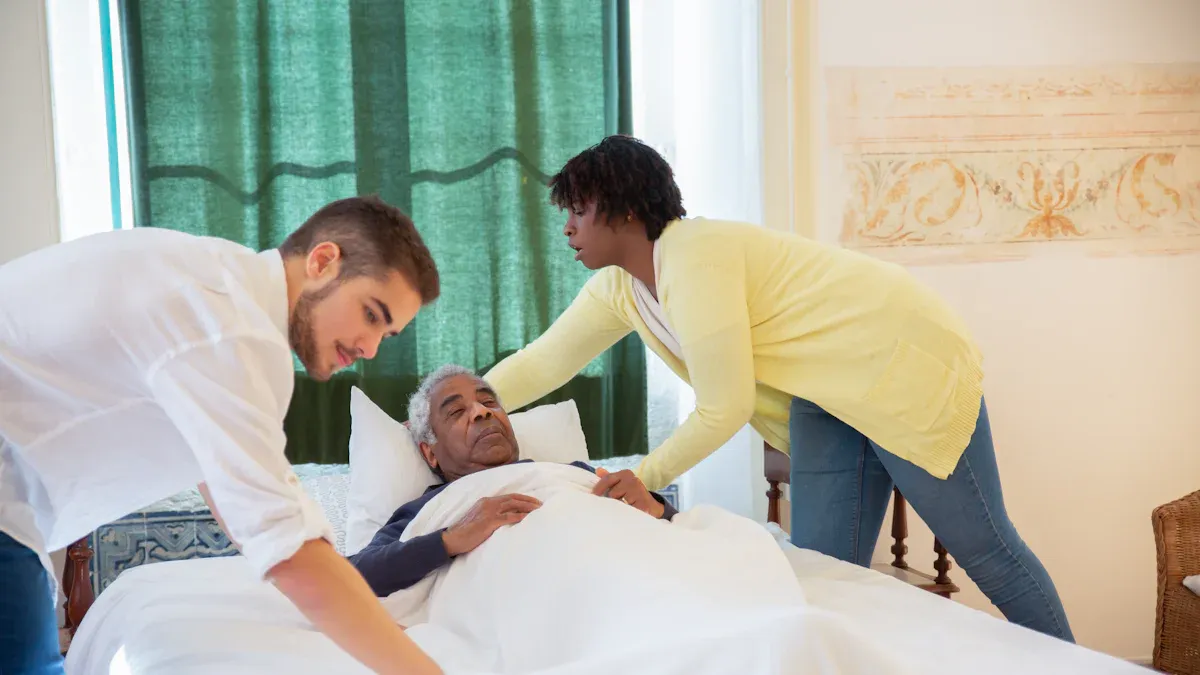How caregivers support cancer prevention and patient care

Caregivers play a crucial role in cancer prevention and patient care. You help loved ones adopt healthier habits, manage treatments, and navigate emotional challenges. Studies show that supportive interventions, such as skills training and counseling, improve outcomes for both caregivers and patients. However, caregiving often comes with financial and emotional burdens. For instance, many caregivers report selling assets or taking out loans to cover healthcare costs. By understanding the role of caregivers in cancer prevention, you can make a meaningful difference while maintaining your own well-being.
Key Takeaways
Caregivers help by promoting healthy eating and staying active. This can lower the chances of getting cancer.
They support regular doctor visits by setting up appointments. Caregivers also teach loved ones why early checks are important.
Giving emotional support is very important. Caregivers comfort patients and help them handle fear and stress.
Caregivers need to care for themselves too. Taking breaks and asking for help can stop them from feeling too tired.
Talking clearly with doctors helps patients get better care. Caregivers should speak up for loved ones and write down important details.
Understanding the Role of Caregivers in Cancer Prevention

Promoting Healthy Lifestyle Choices
Encouraging balanced nutrition and regular exercise
You play a key role in helping loved ones adopt healthier habits. Encouraging a balanced diet rich in fruits, vegetables, and whole grains can significantly reduce cancer risks. Research highlights that nearly half of global cancer deaths could be prevented through lifestyle changes. A Mediterranean diet, for example, is highly recommended for its cancer-preventive properties. Regular physical activity also helps maintain a healthy weight, reducing metabolic risk factors like obesity, which have contributed to a 34.7% increase in cancer deaths over the past decade. By promoting these habits, you empower your loved ones to take proactive steps toward better health.
Helping reduce exposure to carcinogens (e.g., smoking cessation, limiting alcohol)
Reducing exposure to carcinogens is another critical area where you can make a difference. Smoking and excessive alcohol consumption are among the leading behavioral risk factors for cancer. Encouraging smoking cessation and moderating alcohol intake can lower the likelihood of developing cancer. Simple actions, such as providing resources for quitting smoking or creating a supportive environment, can have a lasting impact. Your guidance can help loved ones make these life-saving changes.
Encouraging Regular Screenings and Checkups
Supporting loved ones in scheduling and attending screenings
Regular screenings are vital for early cancer detection. You can assist by scheduling appointments and accompanying your loved ones to screenings. This support ensures they stay consistent with their checkups. Studies show that regular screenings have reduced breast cancer mortality by over 40% and cervical cancer incidence by more than 50% in recent decades. Your involvement can make these life-saving practices more accessible and less intimidating.
Educating about the importance of early detection
Educating your loved ones about the benefits of early detection is equally important. Early diagnosis often leads to more effective treatment and better outcomes. For example, maintaining current screening levels could prevent thousands of deaths from breast, cervical, and colorectal cancers annually. By sharing this information, you help your loved ones understand the value of proactive healthcare.
Providing Educational Support
Sharing reliable information about cancer risks and prevention
You serve as a trusted source of information for your loved ones. By sharing reliable resources about cancer risks and prevention, you help them make informed decisions. For instance, explaining the link between lifestyle choices and cancer risk can motivate them to adopt healthier habits. Your role as an educator strengthens their understanding of how to protect their health.
Helping loved ones make informed health decisions
Your support extends to helping loved ones navigate complex health decisions. Many caregivers actively seek information to guide treatment choices after a cancer diagnosis. In family settings, you often act as a gatekeeper, managing the emotional impact of the diagnosis while ensuring informed decisions are made. This guidance fosters confidence and clarity during challenging times.
How Caregivers Enhance Patient Care

Offering Emotional Support
Being a source of comfort and encouragement
You play a vital role in providing emotional support to your loved one during their cancer journey. A simple act of being present can offer immense comfort. Patients often feel overwhelmed by the physical and emotional toll of treatment. Your encouragement can help them stay positive and motivated. Small gestures, like listening to their concerns or celebrating milestones, can strengthen their resilience.
Helping patients cope with fear, anxiety, and stress
Cancer treatment often brings fear and anxiety. You can help your loved one manage these emotions by creating a calm and supportive environment. Techniques such as mindfulness exercises or relaxation activities can reduce stress. Your reassurance and empathy can make a significant difference in helping them face their challenges with courage.
Managing Daily and Personal Tasks
Assisting with household chores, errands, and personal needs (e.g., bathing, dressing)
Cancer treatment can leave patients physically exhausted. You can step in to assist with daily tasks like cooking, cleaning, or running errands. Helping with personal care, such as bathing or dressing, ensures their comfort and dignity. These contributions allow your loved one to focus on recovery without worrying about daily responsibilities.
Helping with medication management and treatment schedules
Managing medications and treatment schedules can be overwhelming. You can provide essential support by organizing medications, setting reminders, and ensuring timely administration. Many caregivers also assist with medical devices, ensuring they function correctly. This level of care helps prevent complications and keeps treatment on track.
Facilitating Communication with Healthcare Providers
Attending appointments and taking notes
You serve as an advocate during medical appointments. By attending these sessions, you can take detailed notes and ensure that all questions are addressed. This involvement helps your loved one feel supported and ensures they understand their treatment plan.
Advocating for the patient’s needs and concerns
Your role extends to advocating for your loved one’s needs. You can communicate their concerns to healthcare providers, ensuring personalized care. A strong caregiver-patient-provider relationship fosters trust and improves outcomes.
Description | |
|---|---|
Treating the patient as a person | Emphasizes the need for personalized care and understanding of individual needs. |
Seeing the care provider as a person | Highlights the importance of human connection and trust between patients and caregivers. |
Involvement in discussions about care needs | Ensures caregivers actively participate in the care process, improving communication. |
By facilitating communication, you help bridge the gap between your loved one and their healthcare team. This collaboration ensures that their care remains patient-centered and effective.
Monitoring and Responding to Patient Needs
Identifying early signs of complications or side effects
You play a critical role in observing changes in your loved one’s health. Cancer treatments often cause side effects, such as fatigue, nausea, or skin changes. By staying alert to these symptoms, you can help address issues before they worsen. For example, if you notice unusual swelling, persistent pain, or sudden weight loss, these could signal complications that require immediate medical attention.
Tip: Keep a daily log of symptoms and changes in behavior. This record helps you track patterns and provides valuable information for healthcare providers.
Pay attention to emotional and mental health as well. Signs of depression or anxiety, like withdrawal or irritability, may indicate the need for additional support. Your vigilance ensures that your loved one receives timely care and avoids unnecessary discomfort.
Ensuring adherence to treatment plans
Following the treatment plan is essential for recovery. You can assist by organizing medications, setting reminders, and creating a structured routine. For instance, using a pill organizer or a smartphone app can simplify medication schedules.
Practical ways to support adherence:
Prepare a checklist for daily treatments and appointments.
Encourage open communication about any challenges, such as side effects or difficulty following instructions.
Note: If your loved one struggles with a specific aspect of the treatment plan, discuss alternatives with their healthcare team. Adjustments can improve comfort and compliance.
Your involvement reduces the risk of missed doses or skipped appointments. By ensuring consistency, you help maximize the effectiveness of the treatment and contribute to better outcomes.
The Importance of Caregiver Self-Care
Recognizing the Need for Self-Care
Understanding the risks of caregiver burnout
Caregiving can be physically and emotionally demanding. You may face challenges that lead to stress, fatigue, and even burnout. Studies reveal that 42.08% of caregivers report depressive symptoms, while 29% experience elevated anxiety. These emotional strains often stem from unmet needs, with 64% of caregivers identifying at least one significant unmet need. Burnout not only affects your health but also impacts the quality of care you provide. When you neglect self-care, it becomes harder to support your loved one effectively over the long term.
Acknowledging the importance of personal health and well-being
Your well-being is essential for maintaining effective caregiving. Research shows that unmet needs among caregivers can lead to unhealthy behaviors, which jeopardize both your health and the care you provide. By prioritizing your physical and mental health, you ensure that you can continue to offer the best support to your loved one.
Practical Self-Care Strategies
Setting boundaries and asking for help when needed
You don’t have to do everything alone. Setting clear boundaries helps you manage your responsibilities without feeling overwhelmed. Asking for help from friends, family, or community resources can lighten your load. For example, delegating tasks like grocery shopping or transportation allows you to focus on your own needs.
Prioritizing physical health through exercise, sleep, and nutrition
Taking care of your body is just as important as caring for your loved one. Eating nutritious meals, staying active, and getting enough sleep can improve your energy levels and resilience. Simple steps, like walking for 30 minutes daily or preparing balanced meals, can make a big difference. Recognizing signs of stress or fatigue early also helps you take action before burnout occurs.
Seeking Emotional Support
Joining caregiver support groups
Connecting with others who share similar experiences can provide emotional relief. Support groups empower you by offering shared experiences, encouragement, and practical advice. These groups also create a sense of companionship, helping you feel less isolated in your caregiving journey.
Consulting with mental health professionals when necessary
Sometimes, professional guidance is necessary. Speaking with a counselor or therapist can help you develop coping strategies and manage stress. Research highlights that interventions like psychoeducation and therapeutic counseling improve caregiver well-being. These services not only reduce your burden but also enhance your ability to provide care.
Tip: Explore local or online support groups and counseling services to find the right fit for your needs.
Caregivers play an essential role in cancer prevention and patient care. You provide practical assistance, emotional support, and education that improve outcomes for your loved ones.
Caregivers often need to provide care that requires certain professional skills, which are crucial for improved patient outcomes. They also provide emotional support, manage symptoms, and assist with daily activities, especially when patients experience psychological distress and adverse effects from treatment.
Your efforts make a lasting impact. By embracing your role and prioritizing self-care, you can continue to support your loved ones effectively. Take pride in your contributions and remember to care for yourself along the way.
FAQ
What are the most important tasks caregivers handle during cancer treatment?
You assist with daily activities like cooking, cleaning, and personal care. You also manage medications, track appointments, and monitor symptoms. These tasks ensure your loved one stays comfortable and follows their treatment plan effectively.
How can caregivers encourage healthy habits for cancer prevention?
You can promote a balanced diet, regular exercise, and reduced exposure to carcinogens like tobacco and alcohol. Sharing reliable information about cancer risks and supporting regular screenings also helps your loved ones make healthier choices.
What should caregivers do to avoid burnout?
Set boundaries and ask for help when needed. Prioritize your health by eating well, exercising, and getting enough sleep. Joining support groups or consulting mental health professionals can also provide emotional relief and coping strategies.
Tip: Take short breaks during the day to recharge and maintain your energy.
How can caregivers support emotional well-being in cancer patients?
You can offer comfort by listening and being present. Encourage relaxation techniques like mindfulness or breathing exercises to reduce stress. Small gestures, such as celebrating milestones, can boost their morale and help them stay positive.
Why is communication with healthcare providers important for caregivers?
You ensure your loved one’s concerns are addressed and their treatment plan is clear. Taking notes during appointments and advocating for their needs improves care coordination and builds trust between the patient and the medical team.
Note: Prepare a list of questions before appointments to make discussions more productive.
See Also
An In-Depth Overview of Various Cancer Types
Recognizing Symptoms and Treatments for Duodenal Cancer
Identifying Symptoms and Treatment Options for Choroid Plexus Carcinoma
Exploring Symptoms and Treatment Approaches for Conjunctival Melanoma

